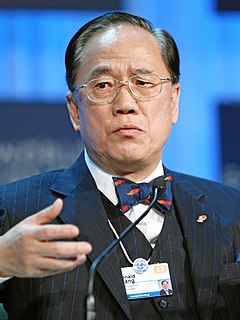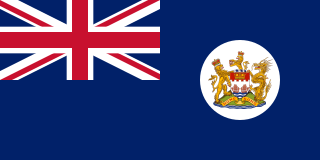| |||||
| Decades: | |||||
|---|---|---|---|---|---|
| See also: | Other events of 2007 History of Hong Kong • Timeline • Years | ||||
This article needs additional citations for verification .(August 2021) |
Events in the year 2007 in Hong Kong .
| |||||
| Decades: | |||||
|---|---|---|---|---|---|
| See also: | Other events of 2007 History of Hong Kong • Timeline • Years | ||||
This article needs additional citations for verification .(August 2021) |
Events in the year 2007 in Hong Kong .
In January 2007, rules were passed to limit the number of pregnant women from mainland China who could give birth in Hong Kong, thus obtaining residency rights for their children. [1] [2]
In March 2007, Chief Executive Donald Tsang won elections for a new five-year term. [1] [2]
In July 2007, with the 10th anniversary of Hong Kong's handover to China, Tsang's new government is sworn in. [1] [2]

The politics of Hong Kong takes place in a framework of a political system dominated by its quasi-constitutional document, the Hong Kong Basic Law, its own legislature, the Chief Executive as the head of government and of the Special Administrative Region and of a politically constrained multi-party presidential system. The Government of the Hong Kong Special Administrative Region of the People's Republic of China is led by the Chief Executive, the head of government.

The Chief Executive of the Hong Kong Special Administrative Region is the representative of the Hong Kong Special Administrative Region and head of the Government of Hong Kong. The position was created to replace the office of governor of Hong Kong, the representative of the monarch of the United Kingdom during British rule. The office, stipulated by the Hong Kong Basic Law, formally came into being on 1 July 1997 when the sovereignty of Hong Kong was transferred from the United Kingdom to the People's Republic of China.

Sir Donald Tsang Yam-kuen is a former Hong Kong civil servant who served as the second Chief Executive of Hong Kong from 2005 to 2012.

The Foreign Correspondents' Club (FCC) in Hong Kong is a members-only club and meeting place for the media, business and diplomatic community. It is located at 2 Lower Albert Road in Central, next to the Hong Kong Fringe Club, and they both occupy the Old Dairy Farm Depot at the top of Ice House Street, one of the few remaining colonial buildings in the Central district.

The Democratic Alliance for the Betterment and Progress of Hong Kong (DAB) is a pro-Beijing conservative political party in Hong Kong. Chaired by Starry Lee and holding 13 Legislative Council seats, it is currently the largest party in the legislature and in terms of membership, far ahead of other parties. It has been a key supporting force to the SAR administration and the central government's policies on Hong Kong.

Hong Kong Disneyland is a theme park located on reclaimed land in Penny's Bay, Lantau Island. It is located inside the Hong Kong Disneyland Resort and it is owned and managed by Hong Kong International Theme Parks. It is the largest theme park in Hong Kong, followed by Ocean Park Hong Kong. Hong Kong Disneyland was opened to visitors on Monday, 12 September 2005 at 13:00 HKT. Disney attempted to avoid problems of cultural backlash by incorporating Chinese culture, customs and traditions when designing and building the resort, including adherence to the rules of feng shui. Notably, a bend was put in a walkway near the Hong Kong Disneyland Resort entrance so good qi energy would not flow into the South China Sea.

The Executive Council of Hong Kong (ExCo) is the cabinet of the Government of Hong Kong, acting as a formal body of advisers to the Chief Executive of Hong Kong that serves as a core policy-making organ assisting the Chief Executive. It is analogous to other Executive Councils in the Commonwealth such as the Federal Executive Council of Australia, the Executive Council of New Zealand, and the Privy Council of the United Kingdom.

The 2005 Hong Kong Chief Executive election was held to fill the vacancy of the territory's top office. Then Chief Executive Tung Chee-hwa submitted his resignation to the central government in Beijing, and was officially approved on 12 March. As Donald Tsang, Chief Secretary for Administration in Tung's cabinet, was the only candidate, he was declared elected unopposed on 16 June. Tsang took office on 21 June to begin his first two-year term.

John Tsang Chun-wah, GBM, JP is a Hong Kong former senior civil servant and government official who was the longest-serving Financial Secretary in the Special Administrative Region period to date.
Tsang Yam-pui is the former Commissioner of Police of Hong Kong from January 2001 to December 2003. Also, he is the brother of the former Chief executive Donald Tsang. Their high positions in the government has referred both of them as the "Two high officials". His father was also a Hong Kong police officer.

The League of Social Democrats (LSD) is a social democratic party in Hong Kong. Chaired by Chan Po-ying, wife of Leung Kwok-hung, it positions itself as the radical wing of the pro-democracy camp and stresses on "street actions" and "parliamentary struggles". It currently holds two seats in the District Councils.

The 2007 Hong Kong Chief Executive election was held on 25 March 2007 to select the Chief Executive of Hong Kong. Incumbent Chief Executive Donald Tsang was re-elected, defeating the pro-democracy challenger, legislator Alan Leong of the Civic Party by 649 to 123 votes in the 796-member Election Committee dominated by the pro-Beijing electors.

Standard Chartered Hong Kong is a licensed bank incorporated in Hong Kong and a subsidiary of Standard Chartered. It is also one of the three commercial banks licensed by the Hong Kong Monetary Authority to issue banknotes for the Hong Kong dollar.

The Political Appointments System is a scheme introduced in 2008 by the Hong Kong Government to reinforce its ministerial team by superseding the Principal Officials Accountability System and inserting two layers of politically appointed officials below the secretaries, who are political appointees. These appointees report only to the secretaries, but not the permanent secretaries, the highest-ranking civil servants. The appointment of undersecretaries and political assistants is an extension of the previous RPAS that was initially confined to principal officials. Prior to the introduction, there were 14 political appointees—3 Secretaries of Departments and 11 Directors of Bureaux.

The Second term of Donald Tsang as Chief Executive of Hong Kong, officially referred to as "The 3rd term Chief Executive of Hong Kong" relates to the period of governance of Hong Kong since the transfer of sovereignty of Hong Kong, between 1 July 2007 and 30 June 2012. Former civil-servant Donald Tsang was the Chief Executive throughout the duration.

The first term of Donald Tsang as chief executive of Hong Kong, officially considered part of "The 2nd term Chief Executive of Hong Kong", relates to the period of governance of Hong Kong since the transfer of sovereignty of Hong Kong, between 25 June 2005 and 30 June 2007. Former civil-servant Donald Tsang was elected on 25 June 2005 to fill the position vacated by the resignation of his predecessor, Tung Chee Hwa.

British Hong Kong was a colony and dependent territory of the British Empire from 1841 to 1997, apart from a period under Japanese occupation from 1941 to 1945. The colonial period began with the occupation of Hong Kong Island in 1841 during the First Opium War. The island was ceded to Great Britain by the Treaty of Nanking, ratified by the Daoguang Emperor in the aftermath of the war of 1842. It was established as a Crown colony in 1843. The colony expanded to include the Kowloon Peninsula in 1860 after the Second Opium War. Hong Kong's territory was further extended in 1898 when the British obtained a 99-year lease of the New Territories.
The 2005 Hong Kong electoral reform was carried out in late 2005 for the selection of the Chief Executive of Hong Kong (CE) in 2007 and Legislative Council of Hong Kong (LegCo) in 2008. The reform proposals were ultimately voted down by the pro-democracy camp.
Conservatism has deep roots in Hong Kong politics and society. As a political trend, it is often reflected in but not limited to the current pro-Beijing camp, one of the two major political forces in Hong Kong, as opposed to liberalism, a dominant feature of the pro-democracy camp. It has also become a political view taken by some localist political parties.

Woo Kwok-hing, GBS, CBE, QC is a Hong Kong retired judge. He was the vice-president of the Court of Appeal of the High Court and former chairman of the Electoral Affairs Commission (EAC) and commissioner on Interception of Communications and Surveillance. In the 2017 Chief Executive election, he received 21 votes in the 1,194-member Election Committee and lost to the eventual winner Carrie Lam.